Travel During COVID-19
You might think now is not the time to travel. By all accounts, you’d be right. The border between Canada and the US is still closed and flights can prove precarious.
However, there are several reasons why taking a road trip right now can also be a positive action.
Stimulate small business economies
While proper social distancing is still essential, many local businesses have been hit hard by COVID-19 safety protocols.
Minimized occupancy capacities, lack of foot traffic, and the constant fear of contraction when set against already tight margins are having significant impacts on small businesses than their full closures back in March did.
A road trip to neighbouring provinces, cities, or states can help stimulate these small business economies and help them replenish their safety nets if visitors make a conscious effort to spend their money local while visiting.
Outdoor-centric trips cater to social distancing
If heading out to a big city is too intimidating right now, camping stands as a socially-distanced alternative for that much-needed getaway.
Everyone sticks to their little familial pods, hand sanitizer is abounding, and s’mores help combat any cases of the doom and glooms.
Mental Health Maintenance
Right now, we’re all spending extended amounts of time locked inside our homes in front of a screen. Time away from these digital vortexes can do wonders for our mental health.
While routine and structure are essential for maintaining a small level of normalcy right now, breaks from that routine are also fundamental for our well-being.
Travel can help remind us of the joys of being a human and should be considered if your remote working lifestyle allows you to cater to it.
How to Do It
Planning
A great deal of the work when remote working on the road is the planning and preparation for your trip before you even get in the car.
We recommend making a plan for where you’re going when you’re going to do your work, and what equipment you’re going to need to complete this work. This helps you time block your work hours more efficiently while also helping you set realistic travel-extravaganza goals as well.
1. Decide what kind of trip caters to your remote work role
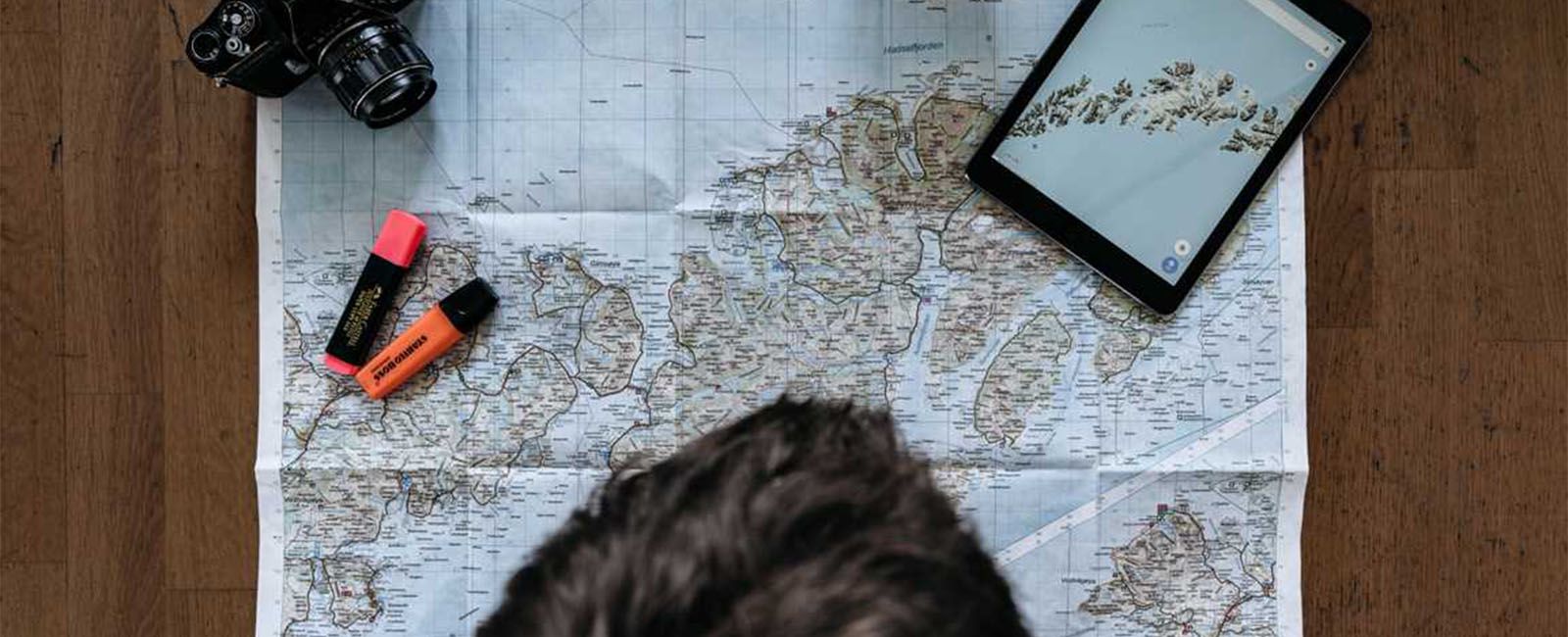
Make sure that the trip you’ve chosen to embark on caters to the structure and duties of your remote working role.
Say, for example, you are a technical project manager looking for a five or six-day road trip getaway to the mountains. Not only will you need to choose town, cities, or campgrounds with strong enough connection capabilities to enact video calls, but you will also need to schedule your travel adventures around your daily meetings.
Make sure you’re setting yourself up for success by catering your trip to your work responsibilities first and the fun stuff after.
2. Coordinate with your boss

Simply letting your boss know that you’re in a different city, province, or state a few days following your departure is not something we would advise.
Instead, have the conversation with your boss as early as possible so that anything that needs to be arranged before your departure can be done so smoothly.
Let them know how you plan on keeping up with your work schedule while on the road and discuss any adjustments that you think you may need while on your trip. For example, attending stand up meetings every other day as opposed to every morning.
It’s best to be as honest as possible here. If you think you may need some leeway on certain things, have the conversation. Your organization may not be able to accommodate all of your requests, but it’s better to be honest than trying and failing, trying and failing, again and again, while hopping around.
3. Pack the essential remote work gear
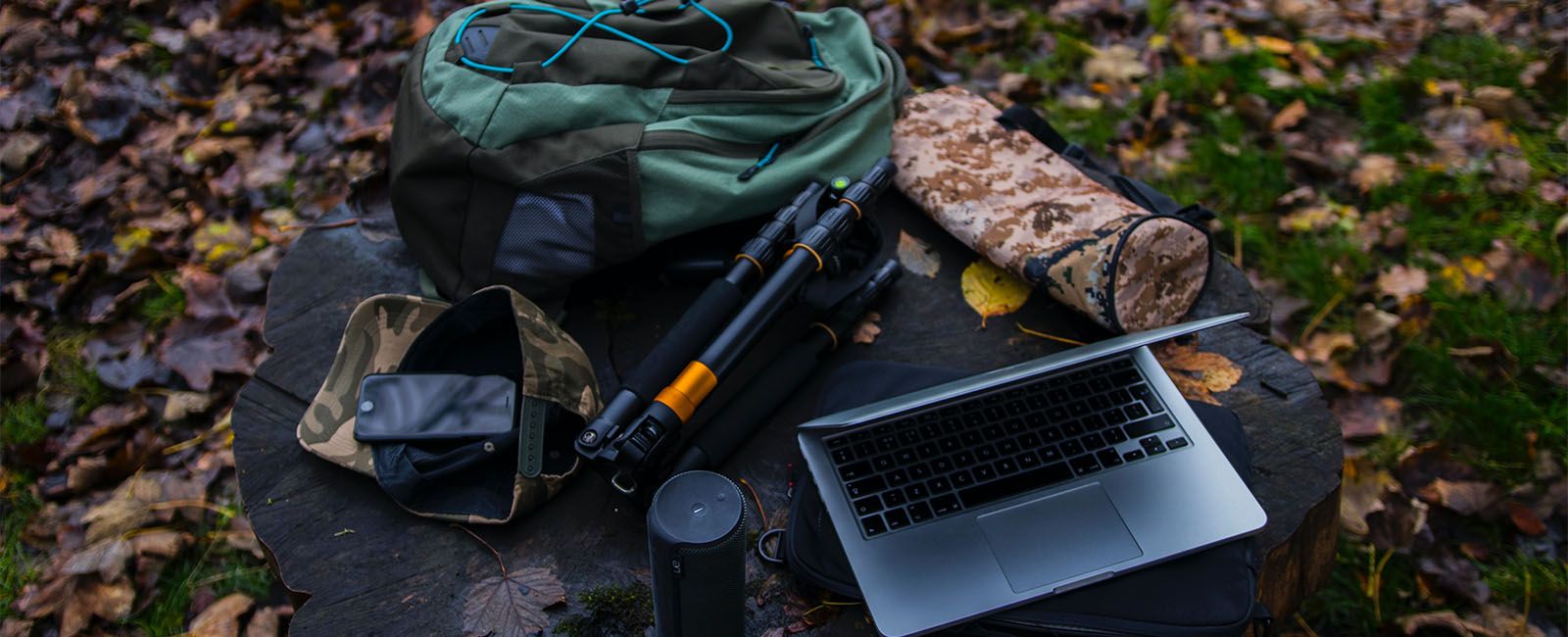
Different destinations require different remote working equipment. However, there are some pieces that we have found useful for all trip styles or locations:
- Laptop
- Laptop Charging cable
- SSD
- Extension cord
- Computer bag
Big City
There’s not much gear you’re going to need when working remotely in a big city. The gear delineated above basically covers it. That being said, bigger cities have more people and therefore more noise. A pair of noise-cancelling headphones might come in handy when working at a cafe or library if you’re opting out of working from your Air BnB or hotel room.
Small Town
Small towns are the wild cards of the group. Some are set up to be a remote worker’s paradise, others, are doing everything in their power to prevent the digital nomads from rolling in.
Both perspectives are valid and we’d bet half the reason you’re interested in heading to the small surf town off the coast of the island is BECAUSE of its unplugged vibe.
It’s better to be over-prepared than under-prepared when it comes to remote working in small towns. We recommend doing some in-depth research before booking accommodations at the local BnB.
Otherwise, you may end up driving 2 hours to work in a Mcdonalds on the highway.
Camping
Campsites are one of the most peaceful places to work from once everything has been set up. You’re quite literally surrounded by nature AND are getting stuff done. The remote worker’s dream.
In addition to the universal work gear listed, you should also consider bringing:
- Additional Cellular Data
- Portable Solar Power Grid
- Converter
- Powerbank
- Laptop
- A tarp or shelter for rain and sun coverage
- Small backup table and chair (in case your site doesn’t have one)
Camping can be touch and go in terms of workflow, but if you arm yourself with the equipment noted above, nothing can stand in the way of you and your work goals!
…save for spotty data coverage… do your research!
On the Road
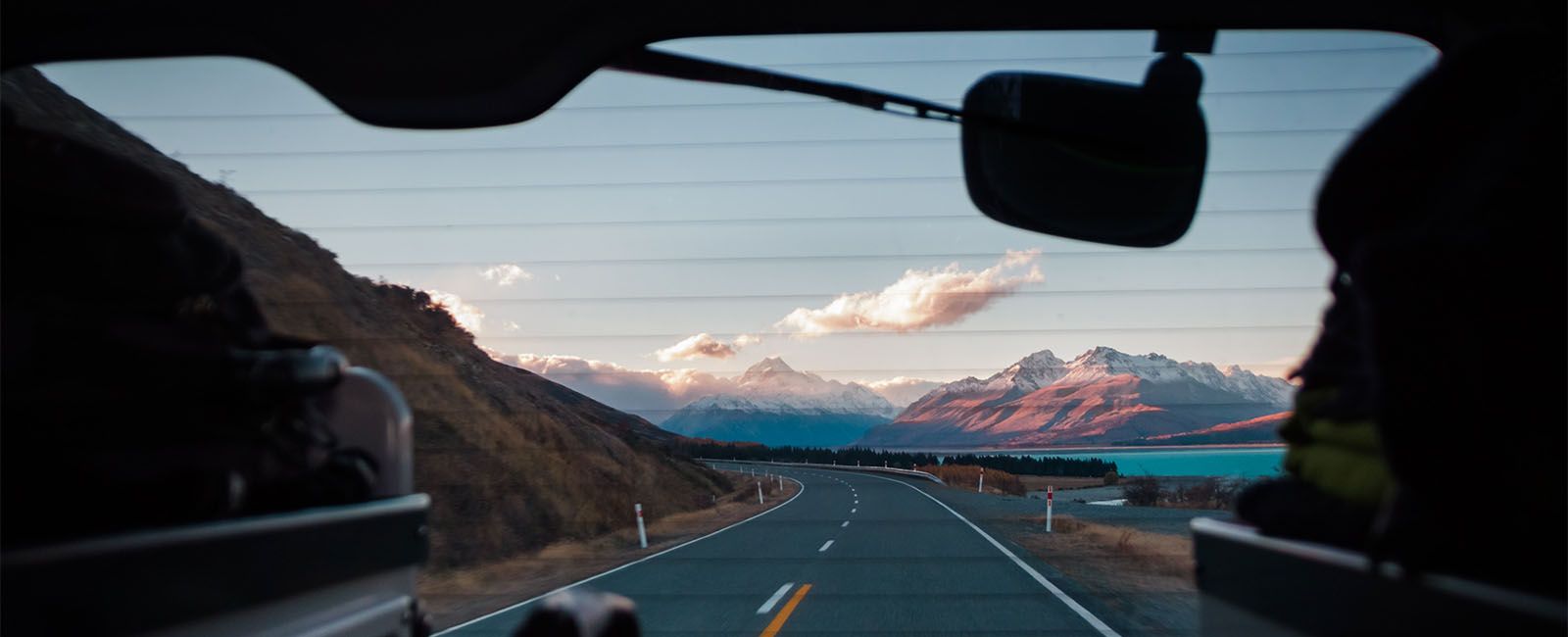
You’ve spoken to your boss, made a plan, packed all your gear, and you’re on the road! Congratulations! The hard work is done and you can kick back and relax… sike.
Working remotely while travelling can, at times, be quite challenging. You have to stay committed, on top of two schedules with conflicting goals, and do so with fluctuating external factors that you have little to no control of.
It can be overwhelming. But don’t worry, we have got you covered there too.
Aren’t we just the best?
1. Approach your days with a goals-based strategy

Sometimes the schedule you’ve created for getting your work done just doesn’t pan out.
Maybe the library you had planned to work at for the afternoon is only doing takeaways during COVID or the campground you’ve been working from has had exceptionally spotty service coverage.
If you plan your days using a goals-based approach, you’ll better set yourself up for the times where travel circumstances get in the way of your original roadmap.
Brendon Buchard, Author of High-Performance Habits, states that prioritization is one of the key factors for goal achievement.
His high-performance planner is designed to funnel your priorities and goals down to the 3 (and only 3) most important tasks you wish to accomplish that day.
The mind can only hold 3-5 action items in its mind at once (Don Norman, Design of Everyday Things).
This forced prioritization helps you order your goals and responsibilities in a way that helps you stay on track and focused while reminding you of your long term why.
We recommend enacting this type of approach with a mix of work AND travel goals every day.
Sit down in the morning and simply write down the 3 most important things you want to achieve that day. For example)
- Finish Remote Work on the Road Article
- Email Founder about copy change
- Go caving at 3 pm
Having your three most important goals or tasks at the forefront of your mind will help you work towards them more effectively even when travel plans for the day go awry.
2. Schedule your work hours
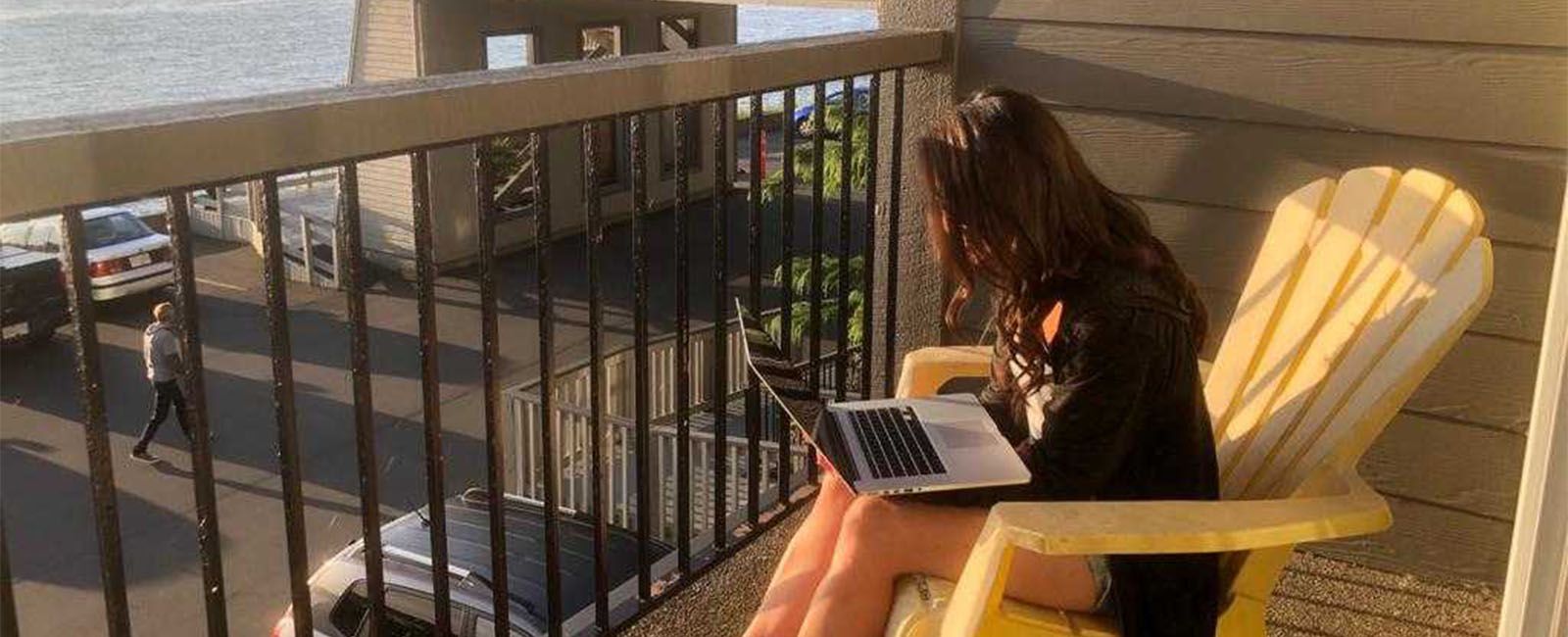
We’ve found that the most effective means for managing work while travelling is to schedule the hours you plan on working every day.
Rather than setting a schedule and attempting to stick to it every day (remember, nothing is certain while you’re on the road), we suggest you take a time blocking approach to your scheduling.
For example) You have two work tasks that you know must get done today and a caving reservation at 3 pm. The night before you can block your time for the next day like:
I know task 1 will take me roughly 3 hours to complete and task 2 the rest of the workday. So I will work from 9 am till 12 pm on task 1, 12 pm to 2 pm on task 2, go caving at 3:30 pm, and then come back and complete task 2 in the evening.
If things go wrong you will, at the very least, have an idea of how long the work is going to take you to get done or how you will need to adjust your day to do so.
3. Do your research
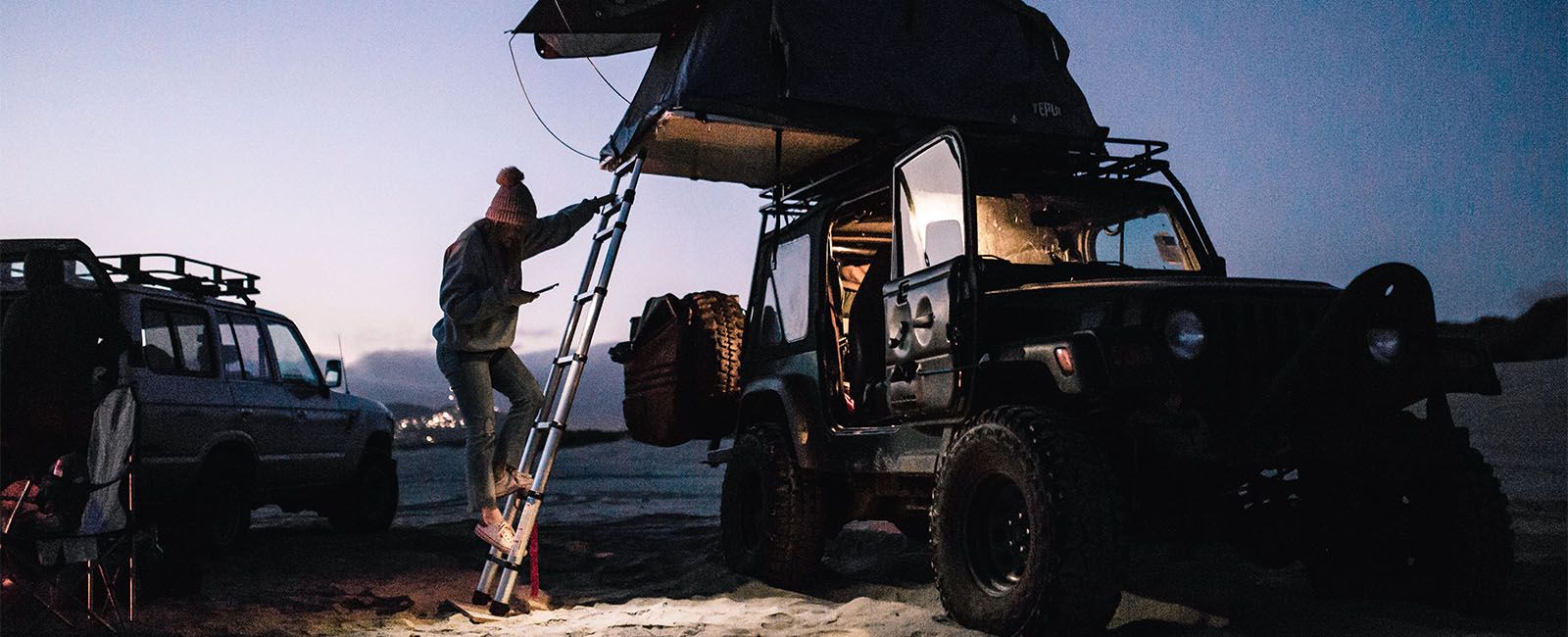
Don’t just assume that the remote town on the coast of the island you’re headed to will have easily accessible WIFI or service coverage for data simply because it’s the twenty-first century.
As mentioned before, we recommend doing some fairly thorough research before selecting and booking anything for your small town sojourn.
Take an afternoon and/or evening and scout out the websites of local coffee shops, libraries, or establishments that you think could work for when you want to hunker down and remote work. If their WIFI capacities aren’t listed there, call and clarify.
Additionally, when you have them on the phone inquire into outlet availability AND current seating set-up. Many businesses have pivoted their business models to match the restraints of social distancing and have closed all or vast amounts of their seating sections to the public as a result. You’ll want to make sure that there’s a place for you to sit on top of being open.
Once you’ve compiled your list, then you can begin booking accommodations.
If you’re choosing to work from a campsite, make sure that the campsite has a wifi connection as well as charging capacities if you aren’t wanting to invest in solar charging power. Additionally, if you plan on using a hotspot to work, make sure you either call and confirm WIFI capabilities (some campground actually sell 24-hour WIFI keys for each site) or look at a cellular service coverage map before booking to make sure that you’ll be able to get a connection.
Things to Remember
Be Adaptable
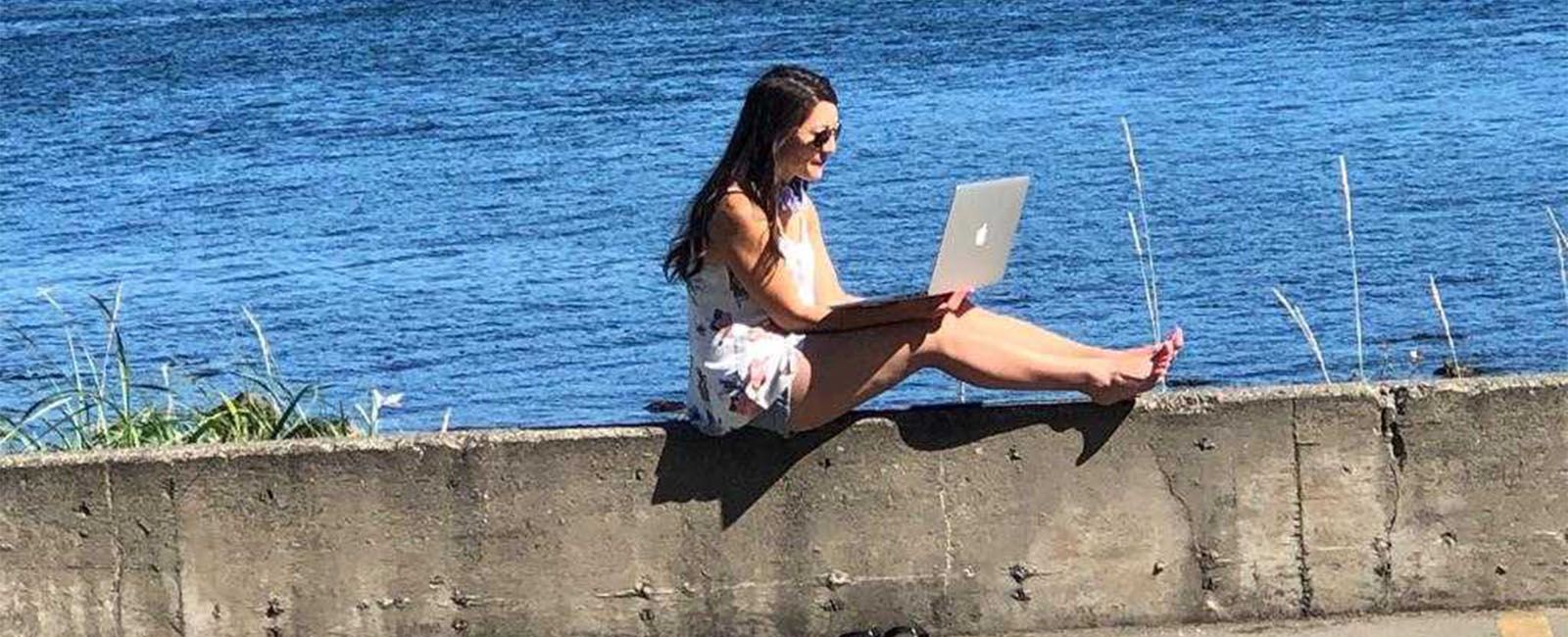
Not everything will go to plan.
Some days your laptop will malfunction and other days, your car, but your road-self will thank you if you approach your trip with an open-minded and adaptable attitude.
Take a cue from our founder (depicted above). While it’s true you’re on holiday, remember it is a _working _holiday. Work still has to get done. Be prepared to work whenever, wherever, if the situation calls for it.
**Having the essential equipment we listed earlier REALLY helps with this ;)
Buy Local

As we mentioned before, try to buy as much as you can locally when remote working on the road.
Many travellers already implement this way of life when travelling as a means of experiencing different cultures in their truest, most authentic forms.
Try and maintain this ideology when hitting the road for some remote work.
Many of the small businesses that you will be visiting get the majority of their business during the tourist season. These funds help them survive during the offseason when business slows down or they close their shops entirely.
So, when you want to eat out, go or pick up food from a local restaurant. When you want to cook, visit the local farmer’s market and buy homegrown goods. If you’re able to, stay at a locally run BnB or hotel over a chain.
Help out the community you are visiting and funnel funds back into their small businesses.
We are STILL in a pandemic

Be conscious of the times. We are STILL in a pandemic. COVID is still a threat. The fight is not over.
Many people are wary of travellers right now and you can’t blame them.
Jumping from place to place. Not having frequent access to the hand-washing stations. Populating busy establishments for longer periods of time… Their wariness makes sense.
Try to be as accommodating as possible.
If there are indoor mask protocols, abide by them. If you’re walking down the street, maintain 6 feet of distance. Try and be as undestructive as possible.
However, if someone is endangering your or your family, damaging your personal property, or antagonizing you simply because you’re not from there, do not hesitate to seek out help.
Unplug
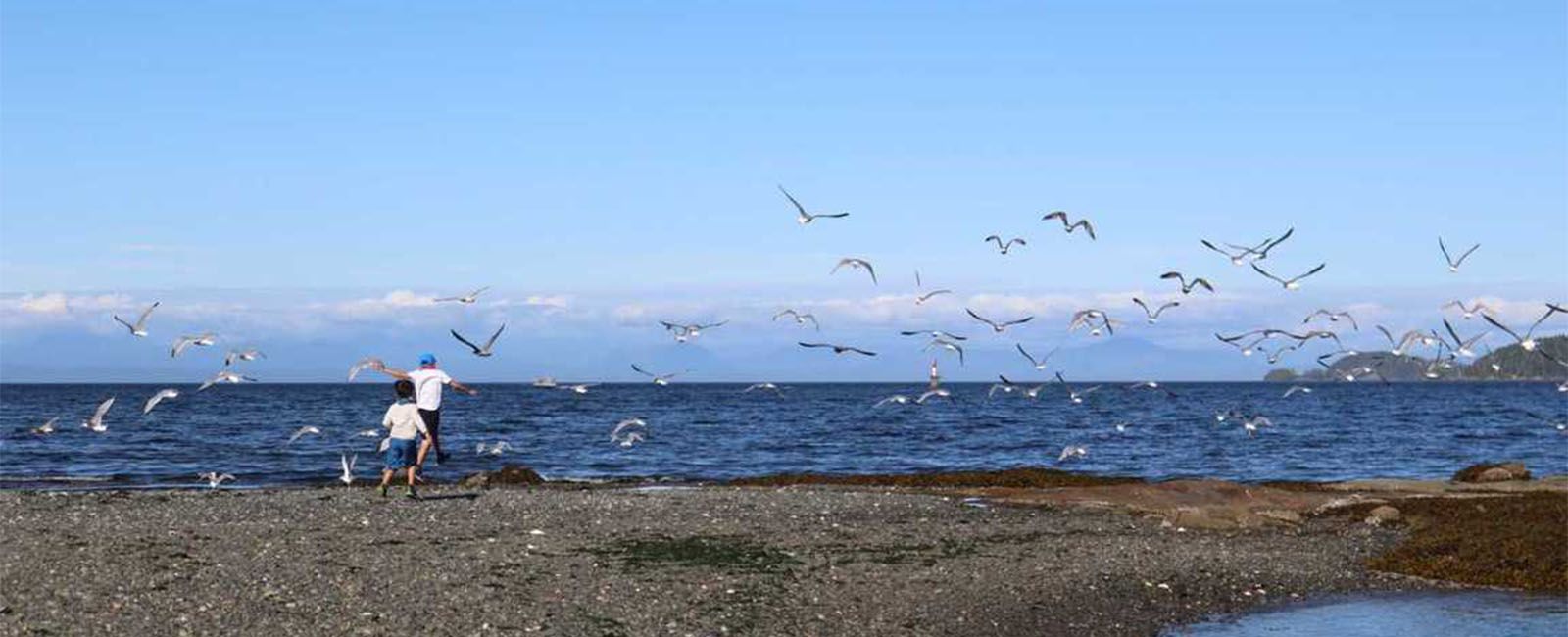
Travel can help us reset, recalibrate, and find inspiration for our work that we might not have been able to find before. However, you need to truly indulge in the perks of travel to reap these thought-provoking benefits for your work.
Yes, you’ll be spending a fair amount of your time working. Yes, you will still need to give your work your full concentration when you are working, and yes, deadlines will need to be meet and meetings will still need to be held.
But you don’t want to get so focused on your work that you forget to enjoy your travels.
Imagine returning home and realizing that you rarely took your head out of the cyber sand to stop and enjoy the literal sand on the beach! The horror.
Make sure to stay present when you’re relaxing and don’t be afraid to unplug during.
Additional Tips
Be cognizant of timezones
Sometimes you’ll be an hour ahead of your team back home. You may need to reschedule meetings so they’re later for your team or you can just get up an hour earlier. It’s a rude awakening to remember this the morning of.
Roll with the punches
Some days will be lost to work. It’s unfortunate but it’s true. You can’t prepare for everything that’s going to happen on the road nor can you anticipate every blunder or bump. Roll with the punches and remember that whoopsies are really just learning experiences.
Give yourself a buffer
Travelling while you’re working is different. You won’t be able to cram pack as many activities and events into your trip as you would if you simply travelling and not working. If you are able to, we would recommend giving yourself a two or three-day buffer. You won’t have to pick and choose between vacation activities and essential work responsibilities and the value of not having to rush through your remote working road trip is invaluable.
Don’t overschedule
We recommend taking a minimalist approach to destination shopping. Fitting in 4 or 5 different towns or cities on a work-free road trip is a challenge in itself. Trying to do that with the additional task of keeping up with your work back home is… staggering. For your first remote work road trip, schedule two or three destinations where you can hunker down for 4 or 5 days at a time before travelling to your next one. Trust on this one, just… trust.
And there you have it! Remote working road trips! How to do them and why you should hit the road. Feel free to follow us on LinkedIn for more remote work and travel insights and check out our other Knowledge Base articles for mentorship and software discussions!
